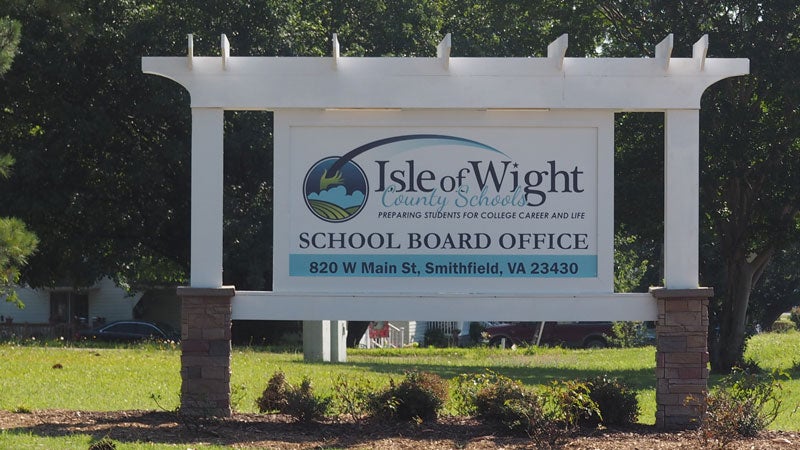IWCS makes case for new employees, buses
Published 12:51 pm Friday, April 19, 2024

- File photo
Isle of Wight County’s proposal to fund its share of state-mandated school employee raises, but none of the new positions Superintendent Theo Cramer has requested, could leave Isle of Wight County Schools with an insufficient number of employees to meet its staffing obligations under the Virginia Literacy Act, an IWCS document contends.
County Administrator Randy Keaton’s proposed $108.9 million 2024-25 budget would give a $3 million increase for the school division’s operating costs, down from the $5 million increase Cramer had requested. The lower amount would cover the division’s share of 3% salary increases included in the Virginia General Assembly’s 2024-26 biennial budget, which is subject to upcoming negotiations with Gov. Glenn Youngkin, but would leave Cramer’s more than 20 new requested positions unfunded.
According to a spreadsheet School Board Chairman Jason Maresh sent on April 17 to Keaton, Board of Supervisors Chairman Joel Acree and Vice Chairman Don Rosie, two of the requested new positions are reading specialists tied to implementation of the Virginia Literacy Act.
In 2022, the General Assembly passed, and in 2023 expanded, the VLA, which mandates every kindergartner through eighth-grader who tests below literacy benchmarks receive “evidence-based supplemental instruction and intervention.”
The law requires one reading specialist for each 550 students in grades K-5 and one per 1,100 students in grades 6-8. Each of the two requested reading specialists would be stationed at the county’s two middle schools.
The IWCS spreadsheet further contends that three new special education teachers and three additional instructional assistants are needed to meet the Virginia Department of Education’s compliance ratios.
“We currently have ratios at WSES, SMS, and SHS that are close to capacity, which does not allow for flexibility with new students,” said IWCS spokeswoman Lynn Briggs. “Those three schools are experiencing a lot of growth so this measure is proactive and based on historical trends.”
IWCS is also requesting an instructor for the division’s new patient care technician career and technical education program. The IWCS document contends that if this program does not begin this fall due to lack of an instructor, the division will need to return $90,000 in grant funds.
Cramer explains bus request
The proposed $3 million for school operations and a $4 million transfer from the county’s unassigned fund balance to fund school-related and non-school one-time expenses also may not cover Cramer’s request for 10 new school buses. Cramer had proposed purchasing five new buses per year starting July 1 and buying another five as one-time expenses to replace some of the division’s oldest and most heavily used buses.
According to division officials, roughly a third of the division’s 65 buses have reached or are nearing the 15-year lifespan or mileage limit when it’s customary to begin looking at replacement.
“Just because something has some age on it is not necessarily the reason for, you know, getting rid of it,” Rosie said at the supervisors’ April 4 meeting, questioning whether the division had a rotation schedule.
Cramer, in an April 16 memorandum to the School Board, contends “to maintain a sustainable fleet, we must adhere to a 15-year rotation plan, necessitating the replacement of 5 buses annually. Following this plan rigorously over 15 years will rectify our rotation schedule by 2040.”
“In Virginia, there’s no explicit state code dictating the useful lifespan,” Cramer’s memo states, clarifying division staff’s earlier remarks to the School Board that had referenced Virginia Department of Education guidance specifying a 15-year or 300,000-mile threshold.
Cramer’s memo refers to this threshold as a “common standard,” with “many districts adhering to a 15-year lifespan or around 250,000-300,000 miles.”
Isle of Wight’s fleet, Cramer’s memo notes, currently has 19 buses manufactured in 2009 or earlier, and six others made in 2010 approaching the threshold. Among these, three have exceeded the 300,000-mile mark and another 10 have surpassed 250,000 miles. The oldest include a 2002 spare bus with more than 279,000 miles and a 2003 still-active bus with more than 307,000 miles.
Isle of Wight County supervisors held their required public hearing on Keaton’s proposed budget on April 18. It drew only two speakers. Supervisors plan to vote on the budget May 9.
Board of Supervisors Chairman Joel Acree, on April 19, said he’d received Cramer’s memo on the buses and the spreadsheet on the new employees, but needed additional time to comb through each document before commenting on the specific funding requests.
The county’s proposed $33.4 million contribution to its school system, which accounts for roughly 30% of the overall $108.9 million budget, plus the proposed $4 million transfer for school-related and non-school one-time expenses, collectively account for “the largest part of our budget,” Acree said.
“There’s been some concerns to say the least concerning their request,” Acree said. “These are tough times for everybody with the cost of everything going up.”
Editor’s note: This story has been updated to correct that the additional special education teachers and assistants would be for students in inclusive classrooms, not self-contained ones.





